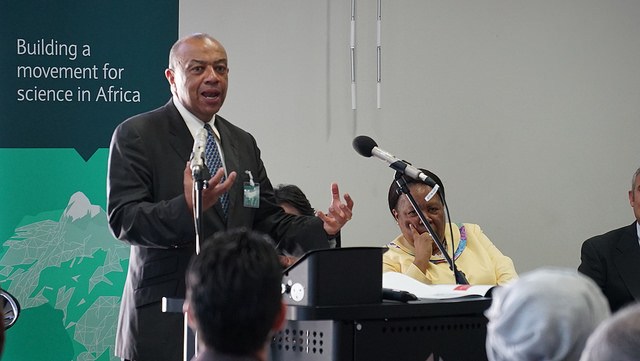The #ScienceAfrica unconference is fast becoming an established event on the calendar for anyone interested in Africa’s scientific and overall development; this year’s unconference was all about declaring ‘no more business as usual’ – and we certainly heard more than a few things, including the three things below, that suggest the scientific and tech community means business about becoming genuinely independent and much more influential on the world stage.
1. Vukuzenzele
A Zulu saying that means ‘Wake Up and do it yourself’ – this cry became the motto for the conference, mentioned over lunch by Professor. Naledi Pandor, South Africa’s Minister of Science and Technology, and then taken up by conference attendees with the enthusiastic encouragement of the conference chair, Lord Boateng.
There couldn’t have been a more apt motto, as this year’s conference was all about changing Africa’s scientific dependency on the rest of the world.
2. Africa’s scientists are on a serious recruitment drive
One of the best things we learned about at the unconference was the launch of an initiative called PASET – (Partnership for skills in Applied Sciences, Engineering and Technology; it was launched way back in 2013 – but hey, we weren’t around then. Anyways, the objective of PASET is to accelerate the creation of a critical mass of a highly-skilled workforce for the socio-economic development. Their goal is to train at least 10, 000 new PhD holders in Applied Sciences, Engineering and Technology programs; establishing a sub-Saharan Africa regional-wide post-graduate scholarship program in ASET programs and ensuring the emergence of at least 5 additional universities in Sub Saharan Africa with high quality ASET programmes and centres of postgraduate studies and applied research in ASET disciplines. Reassuringly, there’s a secretariat and funding behind all of this – and although some criticism at the conference was that 10, 000 new PhDs is nothing compared to the graduates trained by scientific powerhouses such as the UK, US and China – we’re pretty impressed that Africa’s scientific community is mobilising to light a candle rather than curse the dark.
3. President of Mauritius Dr. Ameenah Gurib-Fakim has a lot of sensible things to say
Apart from being the first female Muslim leader of an African country, Dr. Gurib-Fakim of Mauritius is also a scientist who has put her money where her mouth is – before becoming president her research focused on the use of traditional remedies and their adaptation for modern medical uses, and she started a company from the outcomes of her research. Her wide-ranging speech was a smart exploration of the challenges and opportunities for Africa’s scientific advancement – and was a great segue into speeches from Prof. Naledi Mandisa Pandor, South Africa’s Minister of Science and Technology – who challenged international actors to ensure they collaborated properly with Africa’s scientific community. You can hear more of what she had to say on the interview above with the BBC’s Focus on Africa.
There was a lot more learned and said at the unconference which took place on the 21st July 2015, at Ravensbourne College, London. Read more here.

